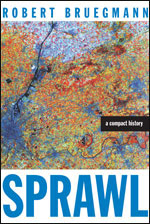Review: Bruegmann, Sprawl

A review written for the Times Literary Supplement summarizes Robert Bruegmann’s latest work, Sprawl: A Compact History, as a “polemic [that takes] issue with one of the great environmental issues of today: how to reconcile the burgeoning demand for detached greenfield settings with the limits on the use of land, energy resources, and the loss of traditional urban cultures and identities.”
While the detractors of suburbanization call it sprawl and assert that it is economically inefficient, socially inequitable, environmentally irresponsible, and aesthetically ugly, Bruegmann calls it a logical consequence of economic growth and the democratization of society, with benefits that urban planners have failed to recognize. The TLS review applauds this unique perspective on the suburbs saying: “In the 20th century the suburbs had bad press. Bruegmann compensates with a book that will be uncomfortable to read for many but is elegantly written and fair to nearly all points of view. Anybody interested in the future of planning policy will have to read it.”
Read an excerpt from the book.